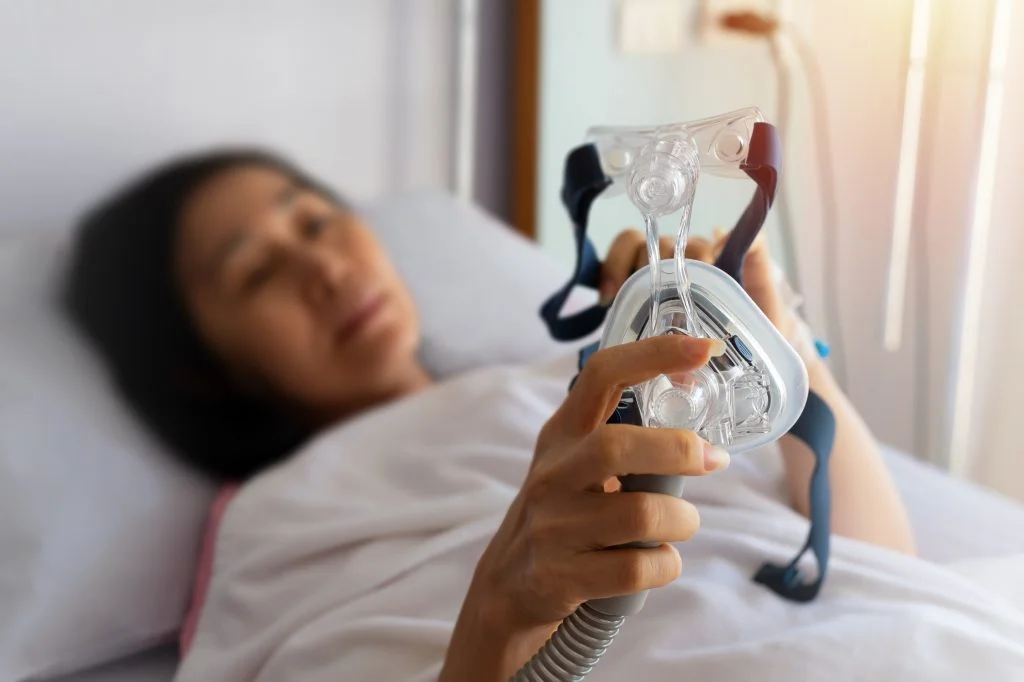
In 1999-2000, around 30 percent of Americans were obese. In 2017-2020, that number rose significantly to around 42 percent. But, from 2021-2023, for the first time in decades, the obesity rate didn’t increase, hovering around 40 percent. (1) Experts have a theory as to why the longstanding epidemic is leveling out — weight loss medicines. Called GLP-1’s, these medications include brand names like Wegovy, Ozempic, and others.
The connection comes from data that in 2023, the use of these drugs spiked, especially in young females, age 12-25. (2) Separately, the U.S. Government has a public goal of reducing overweight and obesity rates in Healthy People 2030, by improving nutrition habits and movement. (3) They are aiming for a 36 percent obesity rate (around 1 in 3 Americans, instead of the current rates of 2 in 5). They are using public policies, programs, and interventions.
However it is achieved, decreased obesity rates may lead to decreased rates of Obstructive Sleep Apnea (OSA) as well, a sleep condition affecting people’s breathing while they sleep. Obesity is a common risk factor for developing OSA, and some who are obese and lose weight see improvement in their OSA symptoms.
The OSA-obesity relationship goes both ways, though, according to the American Academy of Sleep Medicine (AASM). Those with OSA are more likely to struggle with weight gain than those without, as well. (4) And anyone who has tried to lose weight likely knows that sleep is a core necessity for your metabolism, hunger cues, and energy levels — making it tough to lose weight if you are exhausted.
The AASM reports, “Weight loss improves OSA by several mechanisms, including reduction in fatty tissue in the throat (i.e., parapharyngeal fat) and the tongue. Loss of abdominal fat increases mediastinal traction on the upper airway making it less likely to collapse during sleep.”
Proper treatment of OSA, such as through CPAP machines, also helps regular leptin, a hunger-related hormone, the AASM adds. So, for those with both obesity and OSA, treating both at the same time — and receiving adequate support and education about how they interact — is the key to improving each condition separately and together.
This connection might lead those with OSA to seek out weight loss medications. The AASM has pointed out that these drugs are completely changing the complexities of OSA treatment. While these drugs aren’t an official treatment for OSA, for nearly a decade, researchers have known about the connection between weight loss drugs (or the weight loss itself that sometimes comes from them) and improved OSA symptoms. A 2016 study showed a decrease by six episodes per hour compared to a placebo. (5) Additional data in 2024 from two studies show Terzepetide might be an excellent “potential treatment” for OSA, after research revealed around 20-24 fewer episodes of OSA-related breathing issues per hour. (6)
However, there is a specific reason clinicians aren’t handing out prescriptions to all of their OSA patients. First, they aren’t for everyone. In addition, little is known about the long term implications, the AASM writes. For example, some patients report “Ozempic face” referring to sagging skin, along with challenging gastrointestinal symptoms.
The Centers for Disease Control and Prevention are cautioning against knowingly or unknowingly using unapproved versions of these drugs, as they can be risky to people’s health. For example, the FDA warns consumers about counterfeit Ozempic, and also illegal sales online of weight loss drugs. They encourage people who encounter these to report them to the FDA for everyone’s safety.
For others, weight loss drugs might be the best OSA treatment available, under doctor supervision. Researchers and clinicians, and patients alike will have their eye on the potential short and long term pros and cons of using weight loss medicine to improve OSA. In the meantime, though, those with OSA shouldn’t attempt to substitute these drugs for their prescribed treatment such as a CPAP, for their own safety. Keep an open dialogue with your provider around the topic of obesity, weight loss medication, and OSA.

Can Ozempic Impact Sleep? Social Media Study Finds Theme of Ozempic-Related Sleep Issues

Sleep Apnea Might Be the New Way to Access Ozempic and Weight Loss Drugs

Get Physical or Snooze? What to Know About Exercising Early Versus Sleeping in

If You Have Sleep Apnea, Certain Kinds of Exercise Are More Than Just ”Good for You”
Sources
1. Tin, Alexander; “Obesity rate in U.S. adults no longer growing, new CDC data suggests,” CBS News; https://www.cbsnews.com/news/obesity-rate-us-adults-cdc-data-map/; September 24, 2024.
2. Roy, Tessa; “Young people are increasingly using Wegovy and Ozempic,” University of Michigan; https://www.michiganmedicine.org/health-lab/young-people-are-increasingly-using-wegovy-and-ozempic; May 22, 2024.
3. Office of Disease Prevention and Health Promotion; “Overweight and Obesity,” Healthy People 2030; https://health.gov/healthypeople/objectives-and-data/browse-objectives/overweight-and-obesity
4. American Academy of Sleep Medicine; “The Link Between Obesity and Obstructive Sleep Apnea,” AASM; https://aasm.org/wp-content/uploads/2022/07/ProviderFS-Obesity-and-Obstructive-Sleep-Apnea.pdf
5. Blackman, A., Foster, G., Zammit, G. et al. Effect of liraglutide 3.0 mg in individuals with obesity and moderate or severe obstructive sleep apnea: the SCALE Sleep Apnea randomized clinical trial. Int J Obes 40, 1310–1319 (2016). https://doi.org/10.1038/ijo.2016.52
6. Atul Malhotra, M.D., Ronald R. Grunstein, M.D., Ph.D., Ingo Fietze, M.D., Terri E. Weaver, Ph.D., Susan Redline, M.D., M.P.H., Ali Azarbarzin, Ph.D., Scott A. Sands, Ph.D.; “Tirzepatide for the Treatment of Obstructive Sleep Apnea and Obesity,” New England Journal of Medicine; https://www.nejm.org/doi/10.1056/NEJMoa2404881; June 21, 2024.

























